Laptop Mag Verdict
Elden Ring’s engrossing scope and excellent progression systems make it the most intricate FromSoftware RPG yet. And although it has quite a few repetitive moments, the game’s grandiose open world and electrifying spectacle usually make up for it.
Pros
- +
Striking environments
- +
Wondrous exploratory freedom
- +
Breathtaking sense of scale
- +
Bosses are relentlessly vicious
- +
Invigorating combat exchanges
- +
Masterful systems elicit unrivaled build diversity
Cons
- -
Occasionally repetitive open world
- -
Mini-dungeons need more diversity
- -
Frequent enemy and boss reuse
Why you can trust Laptop Mag
In my preview piece for Elden Ring, I called the game “aimless.” I felt underwhelmed and boldly stated that it “occasionally echoes the vacantness seen in other open-world titles.” This claim, which was made after seven hours of play time, is no longer representative of how I feel after completion.
Elden Ring offers the most potent sensations of grandeur I've experienced while exploring an open world. Its immense scale and sense of freedom contrasts wonderfully with the terrors that linger throughout its derelict plains. Additionally, FromSoftware presents a robust mechanical evolution to its Soulsborne formula, providing an unmatched level of character diversity, allowing the player to tackle the many creatures of this world in whatever fashion they please. The game suffers from some repetitive bossfights and rehashed ideas, but The Lands Between continued to surprise me until the very end.
It’s certainly one of the best PS5 games, best PC games, and best Xbox Series X games to date.
Liberty and death
Elden Ring’s open-world carefully balances familiarity, staggering spectacle, and the tranquility of nature. During one moment, you’re trudging through a shallow lake occupied by poisonous spores when a gargantuan dragon descends onto a group of enemies surrounding a bonfire. Once a health bar appears at the bottom of the screen, every part of your body will shiver with fear.
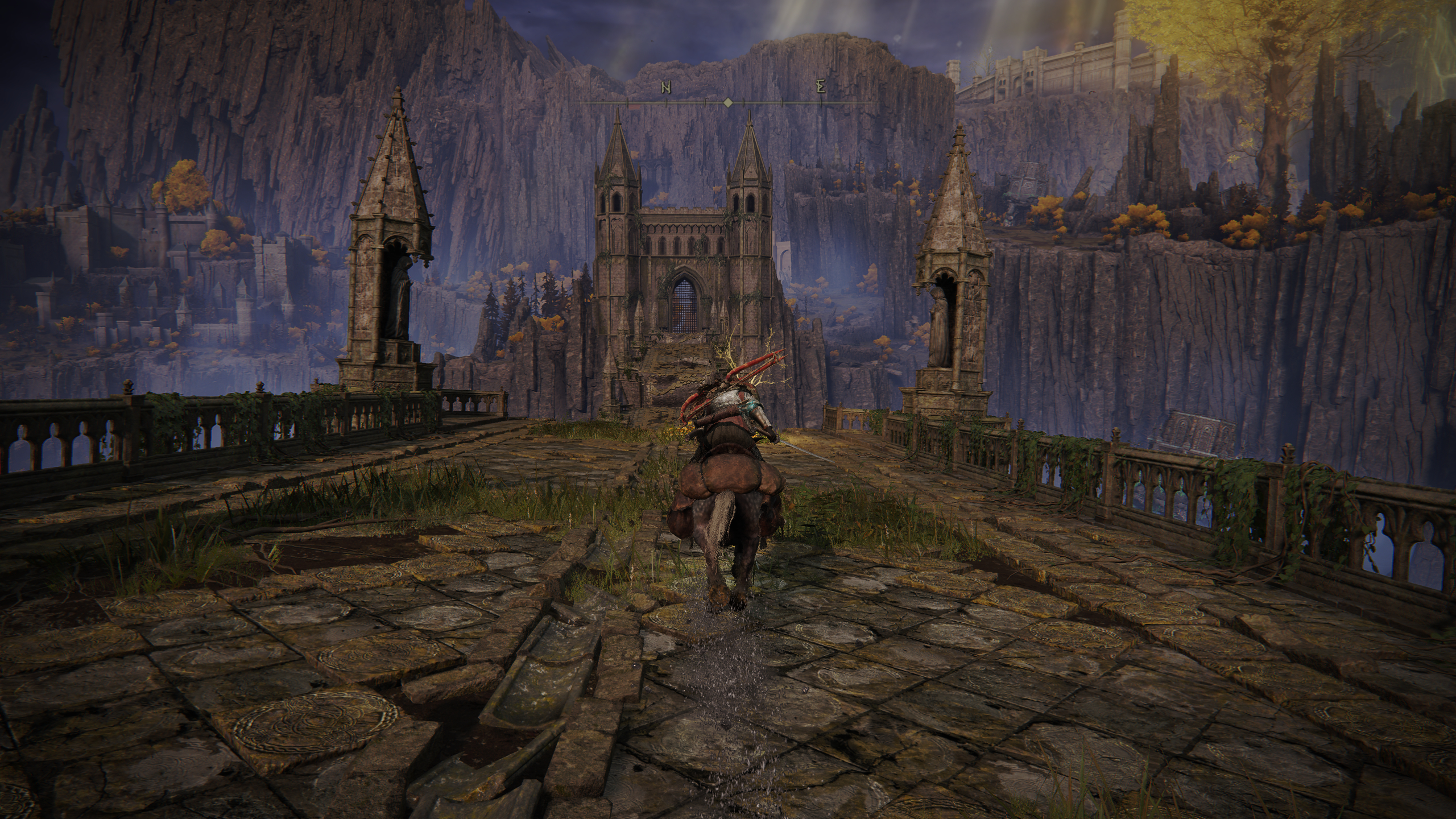
At another moment, you’re traveling uphill to the peak of a mountain as currents of wind encircle your character, creating a sense of dread for what’s to come as a pack of wolves descend from the trees above. And if you rush into a specific direction, a curiously placed collection of rocks erupts into a glowing stone golem that stumbles towards you with a murderous conviction.
FromSoftware’s world elicits more than just grandiose spectacle. Much like Scotland’s expansive landscapes, which appear to be an inspiration for the game’s environments, plenty of moments give the player an opportunity to breathe. Elden Ring isn’t all about fighting; it feels equally invigorating when casually riding through its expansive mountainous plains. The gusts of gentle wind compliment the atmospheric music, and although the world is ripe with monsters, seeing herds of deer weave through forest thickets is calming.
When taking in an area from afar, it possesses the quality of a fantastical painting. As the player overlooks the glowing yellow trees towering over them and a castle hanging on the edge of a cliff, the art elicits that same ethereal sensation other FromSoftware games do. But now, if the player sees something in the distance, they know they can get to it. Soulsborne has presented us with huge kingdoms, massive cities, and expansive natural regions, but many were backdrops. In Elden Ring, almost everything visible is accessible.
Sign up to receive The Snapshot, a free special dispatch from Laptop Mag, in your inbox.
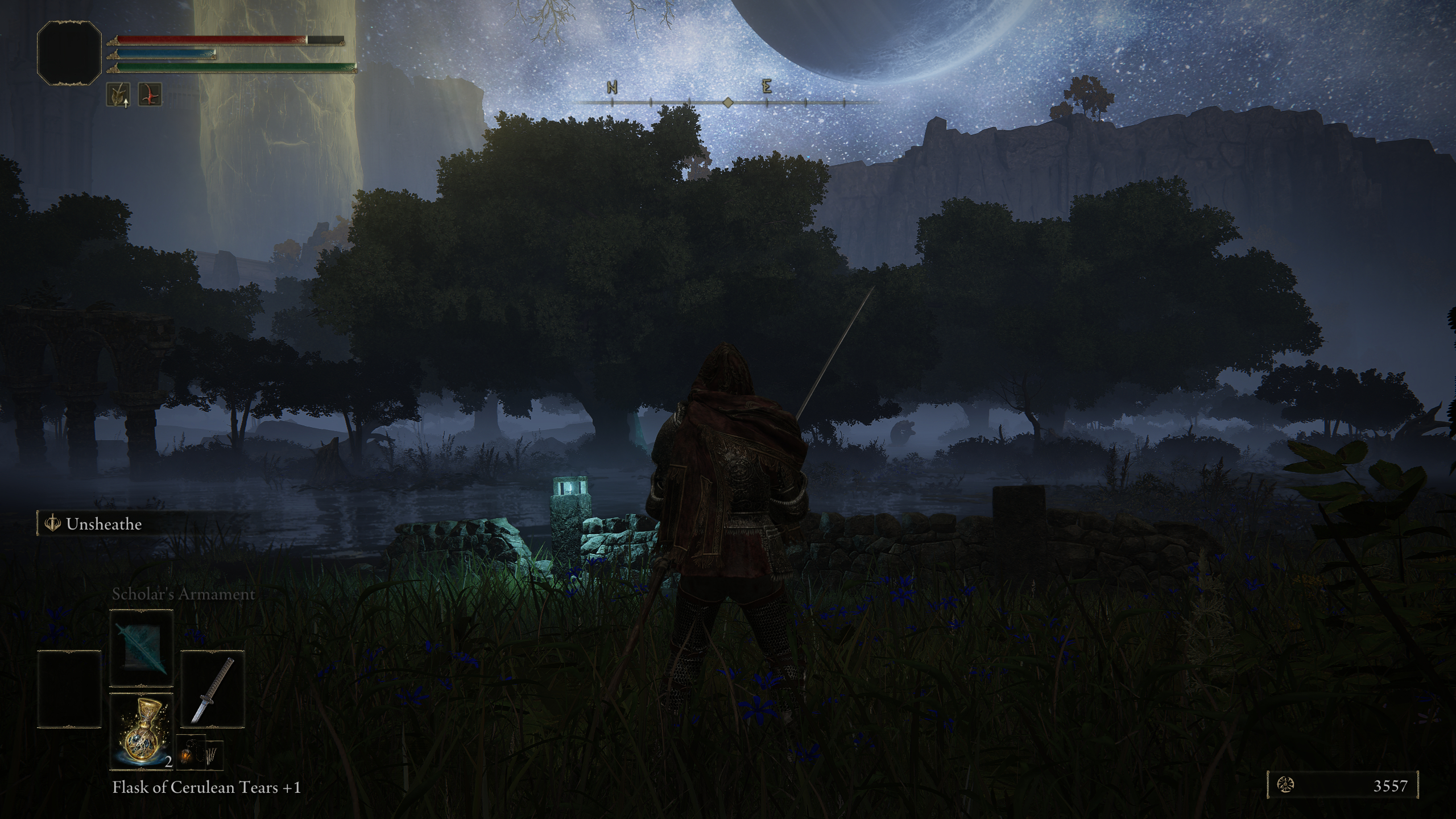
As the player rides through these plains, they could easily find themselves stumbling upon an area as striking as those that FromSoftware is known for crafting. And when overlooking a massive region, players will see something interesting and wonder how they might reach it. This is a huge part of what makes Elden Ring special; where Soulsborne often presents areas to the player in a linear fashion, Elden Ring gives you the opportunity to discover secrets that lead to the game’s most memorable moments.
Revolution in atmosphere
The Lands Between harbors difficult encounters, but the gentleness of its world makes it more approachable than any other Soulsborne. These environments are full of wildlife, colorful scenery, and are designed to prioritize player agency.
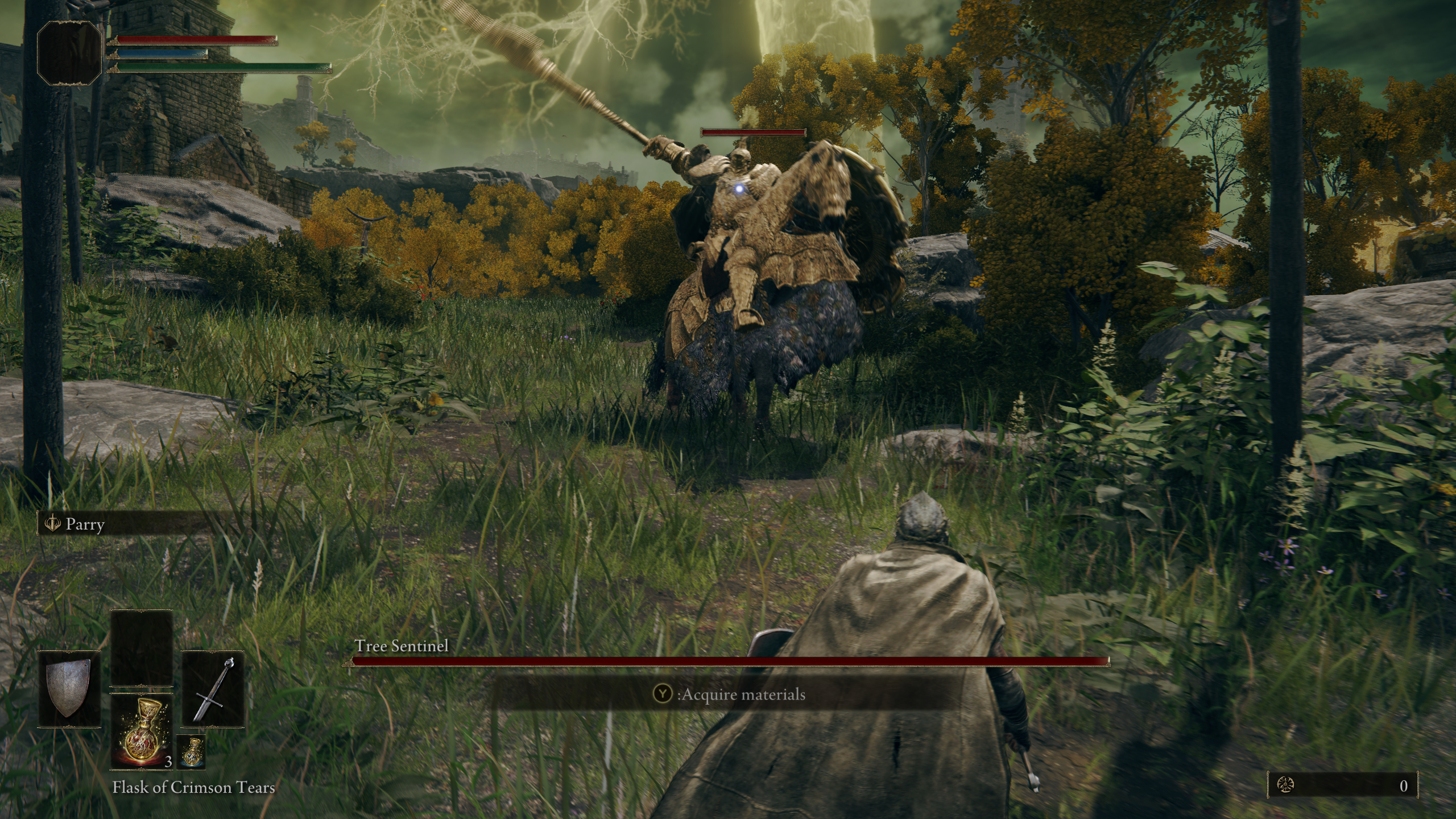
If you're stuck on a boss, you can completely avoid them. Elden Ring is massive, and this is evident by the placement of Tree Sentinel in the opening of the game. You can attempt to beat him, but it should be obvious that you're not ready. Players can travel to other areas throughout Limgrave to level up and acquire equipment, weapons or spells. This approachability is enhanced by the map system, where you can teleport throughout the world, mark points of interest, and get a deeper understanding of the surrounding land.
The claustrophobic hopelessness of Dark Souls is rarely felt in Elden Ring. This world is liberating, and instead of tossing the players into the throes of dark fantasy, there's hope throughout The Lands Between. With Elden Ring, FromSoftware has traded oppression for freedom, marking a fascinating shift for the series.
Phenomenal Legacy Dungeons
Elden Ring's open-world is liberating, but FromSoftware hasn't abandoned its well-known structure. Legacy Dungeons are placed throughout The Lands Between and act like the classic areas you'd find in Soulsborne.
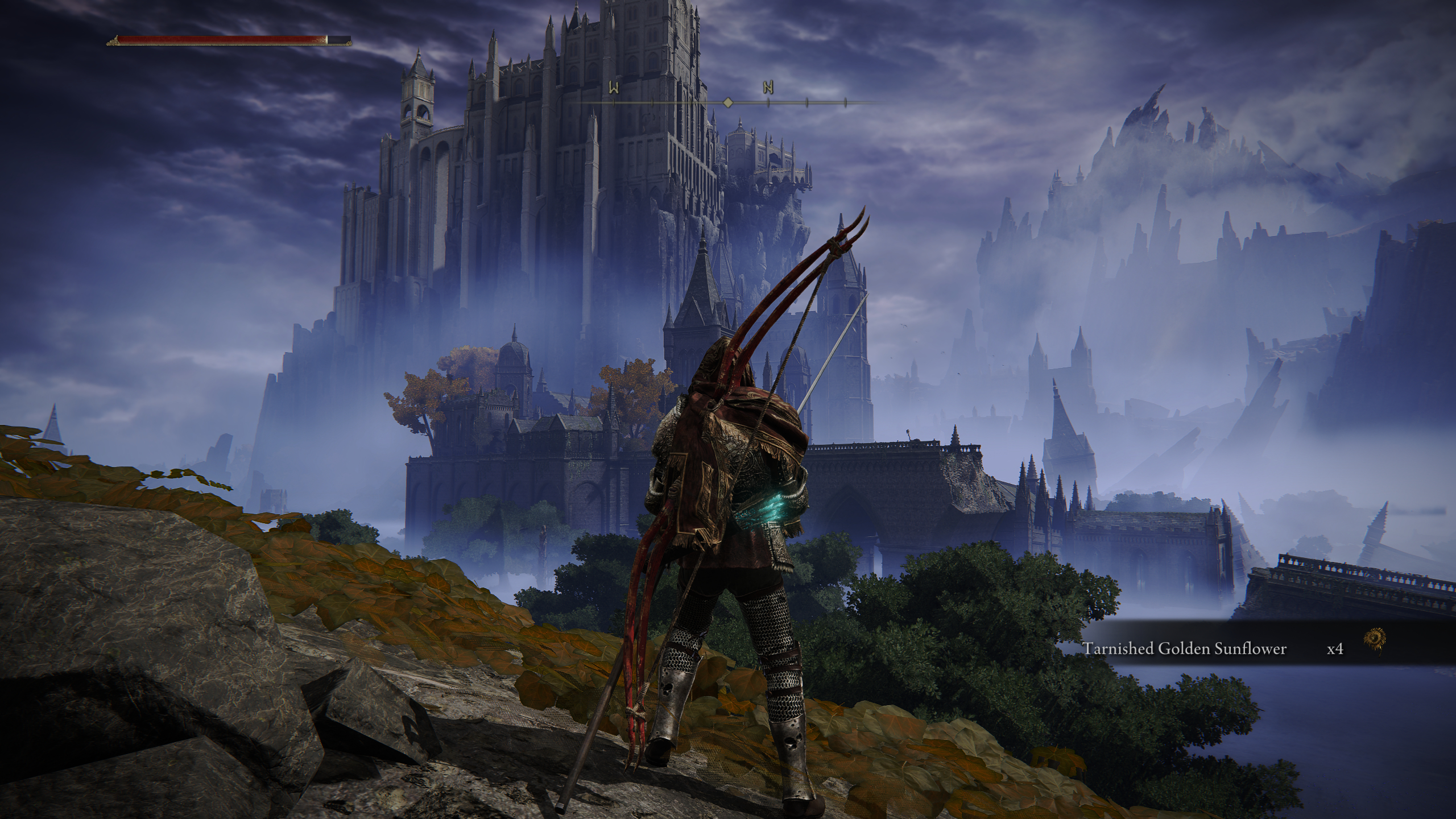
Understanding where the massive castle you just explored sits within an area adds a new level of investment, shifting your understanding of the world’s scope. FromSoftware is the master of atmosphere in the medium, so it’s no surprise that these classic areas are excellent. A player's first steps up towards Stormveil Castle are unforgettable. Battling a terrifying figure upon a worn bridge leading into a colossal castle as a flurry of clouds and wind encompass the arena is the level of splendor I expect out of the company.
Elden Ring takes the fundamental designs of an open-world game and applies those ideas to its Legacy Dungeons. There are secret paths and areas to explore these spaces in a non-linear fashion. You can leap across rooftops, fall down into later sections of the level, or even hop up tiny bricks to find secret items. These places start with an entrance and end with a boss, but everything in-between is up to you.
This is a huge part of what makes Legacy Dungeons excellent, as it doesn't just feel like a Bloodborne area has been forced into the world of Elden Ring. Instead, these spaces can be explored in unique ways, and offer striking visual moments, excellent interconnectivity within the level design, and memorable combat encounters.
Ashes of War are brilliant
Elden Ring introduces new systems to expand upon the combat in Dark Souls 3. Ashes of War imbue basic weapons with special skills, while simultaneously modifying what affinity that weapon has. Where previous Soulsborne games forced the player to build out the weapon a specific way from the start, Elden Ring puts an incredible amount of freedom in their hands.
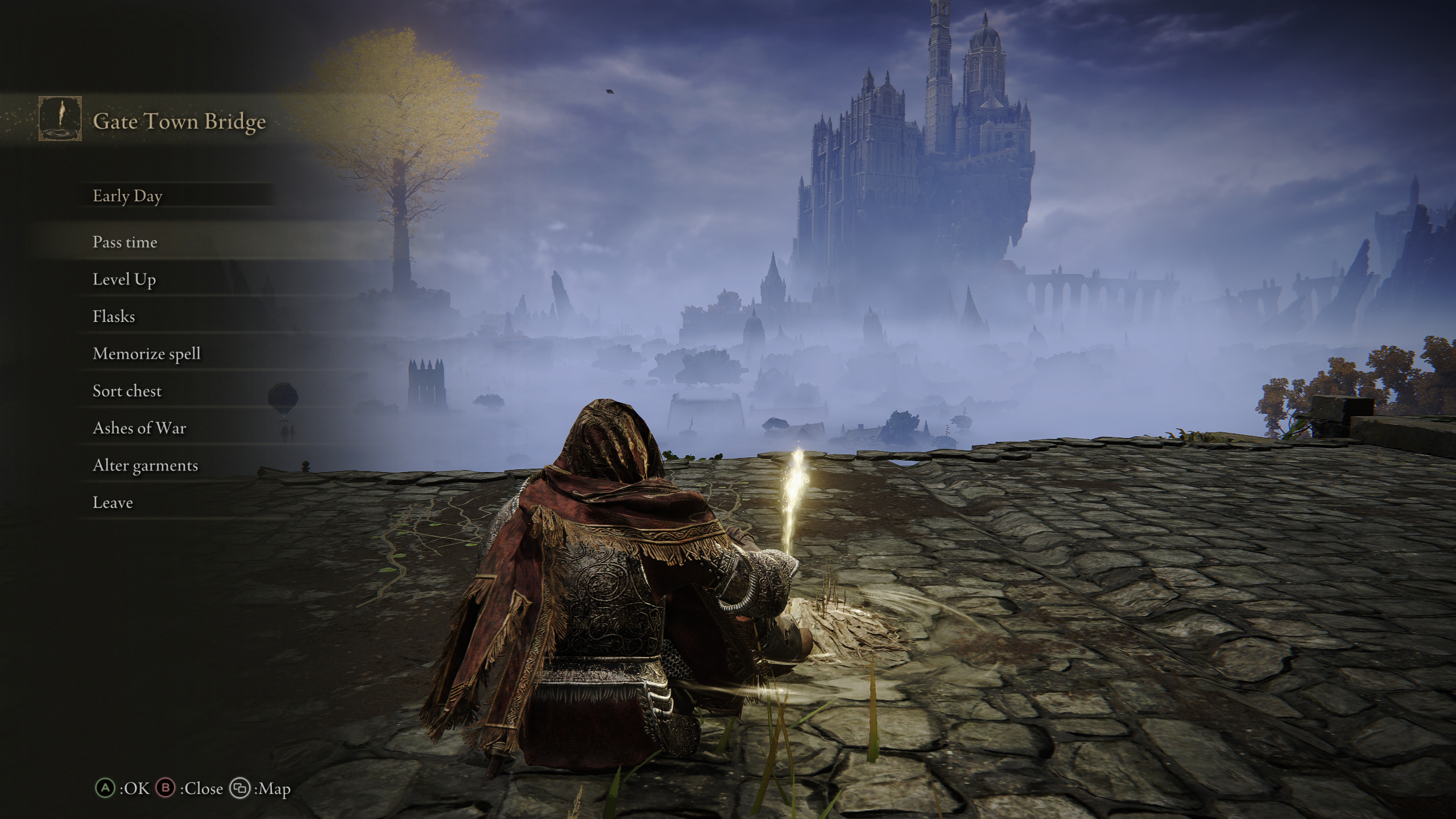
You’re no longer tied to a single weapon, and even if you decide to reset your character stats (which can be done easily), you can quickly modify the affinities on those weapons. My Uchigatana is currently set to the Keen affinity, which means it scales the best with the Dexterity stat. To change this, all I need to do is go to a Grace point and select the “Ash of War” menu. With the press of a button, I can change it to whatever I want at no cost, whether it be to scale with Intelligence, Faith or Strength. However, this does not apply to the game’s special weapons, which have Ashes of War tied to them inherently and cannot have their affinities or special abilities modified whatsoever.
Ashes of War also act as special skills, which the player uses to execute a special maneuver at the cost of Focus Points. With my Uchigatana, my character will sheathe the weapon and hold their position until I let go, which is when they’ll unleash a devastating strike against whatever is in front of them.
Freely allowing the player to swap between Ashes of War, upgrade weapons in abundance, and easily change affinities gives players the opportunity to experiment more than ever before. I have eight weapons on rotation, and often jump between different movesets and magical abilities to conquer whatever fight lies ahead. Just a few examples include a handaxe that lets my character stomp on the ground and emit a wave of ice shards, a rapier that can channel my health points into a devastating blood slash, and dual swords which I can bring together to imbue with holy light.
Greater defensive complexity
Much of the hardship in Soulsborne comes from learning to dodge at the right time, though that may be an oversimplification of the series’ difficulty. Sekiro introduced more layers by encouraging the player to parry, jump and counter.
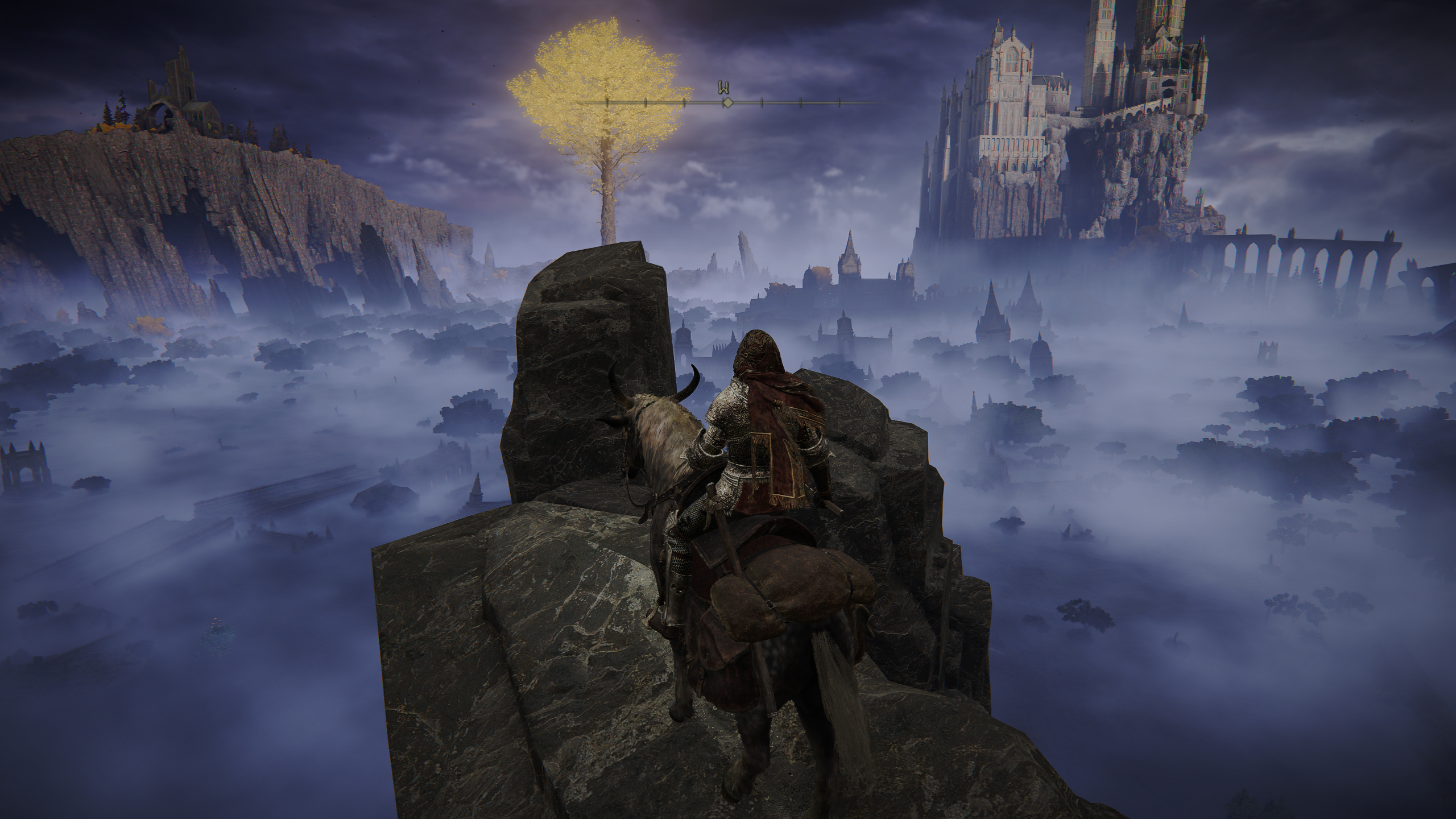
Elden Ring has done something similar by bringing jumping, mounted combat, and crouching to the formula. Certain enemies possess attacks that erupt a shockwave across a wide area, and instead of rolling through these attacks, it’s safer to jump over them. While something as simple as the addition of a jump button might seem like a silly thing to get excited about, it shifts the tides of battle, forcing the player to be conscious of more than just dodging at the right time. These attacks can be rolled through, but it’s far more difficult to execute than just hopping into the air.
In the open world, you can mount up at any time, even when in the middle of a fight. If your mount dies in battle, resummoning them will consume a Flask of Crimson Tears, which is essentially the game’s equivalent of an Estus Flask (health potion). Players will find themselves in situations where attacks cannot be avoided without summoning their mount. The steed won’t roll away from enemies, but its swiftness can avoid all-encompassing breath attacks and abilities targeted on specific spaces at a significantly greater pace. However, you need to use this cautiously, as being knocked off your mount causes a long moment of vulnerability
Players can crouch at any time, allowing you to hide in bushes and sneak up behind unsuspecting enemies for a devastating backstab. Not only has stealth been helpful for sneak attacks, but players can subtly cast spells that take a while to activate.
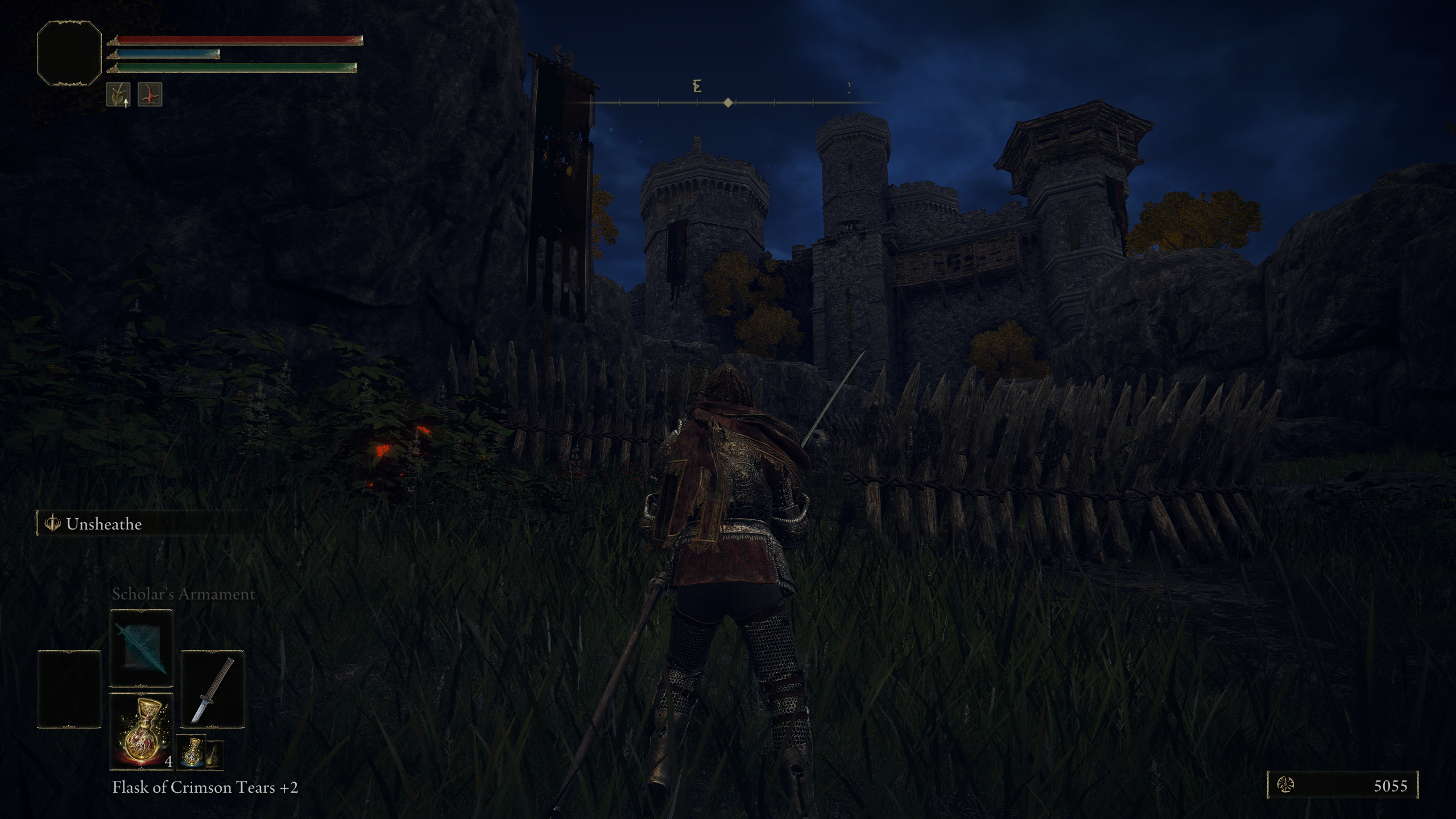
Players can also commit a counter slash when successfully blocking an attack, in which they press the heavy attack button when an enemy hits their shield. This isn’t useful against every enemy, but it can be quite important depending on your build.
Elden Ring even introduces Ashes, ghosts of previously encountered characters (whether they be friend or foe) to summon at the player’s side in battle. These can be enhanced in the same way one would upgrade a weapon, and they can be useful during hectic battles in the open world. Elden Ring is sometimes relentless in the number of enemies it throws at the player, and although I haven’t put Ashes to use very much, it has saved my life when a dozen enemies have come charging at me in the plains of The Lands Between.
However, sometimes these boons vary in their reliability, as the size of Elden Ring’s world means the difficulty is inconsistent. You might go through a whole fort, one shot nearly every enemy, and beat the boss on your first attempt. And then you’ll trudge through a kingdom sunken in poisonous ooze and die a dozen times, with the boss absolutely whooping you into shape. I've intentionally used weaker weapons throughout less challenging moments, which isn’t something I’ve done in Soulsborne previously. If you’re someone who lives for the difficulty, Elden Ring’s nonlinearity will result in some easy moments. On the other hand, the game also boasts the hardest boss I've ever fought.
Hyper(boss)tension
Elden Ring, like much of FromSoftware’s recent catalog, features a focus on exhilarating exchanges between the player and bosses. These bosses can be found anywhere in the world, whether it's deep within a catacombs or patrolling a random bridge in the middle of Limgrave (the game’s first area). And to further expand upon the ruthlessness of Dark Souls 3, these bosses boast movesets more unpredictable and difficult to manage than ever before.
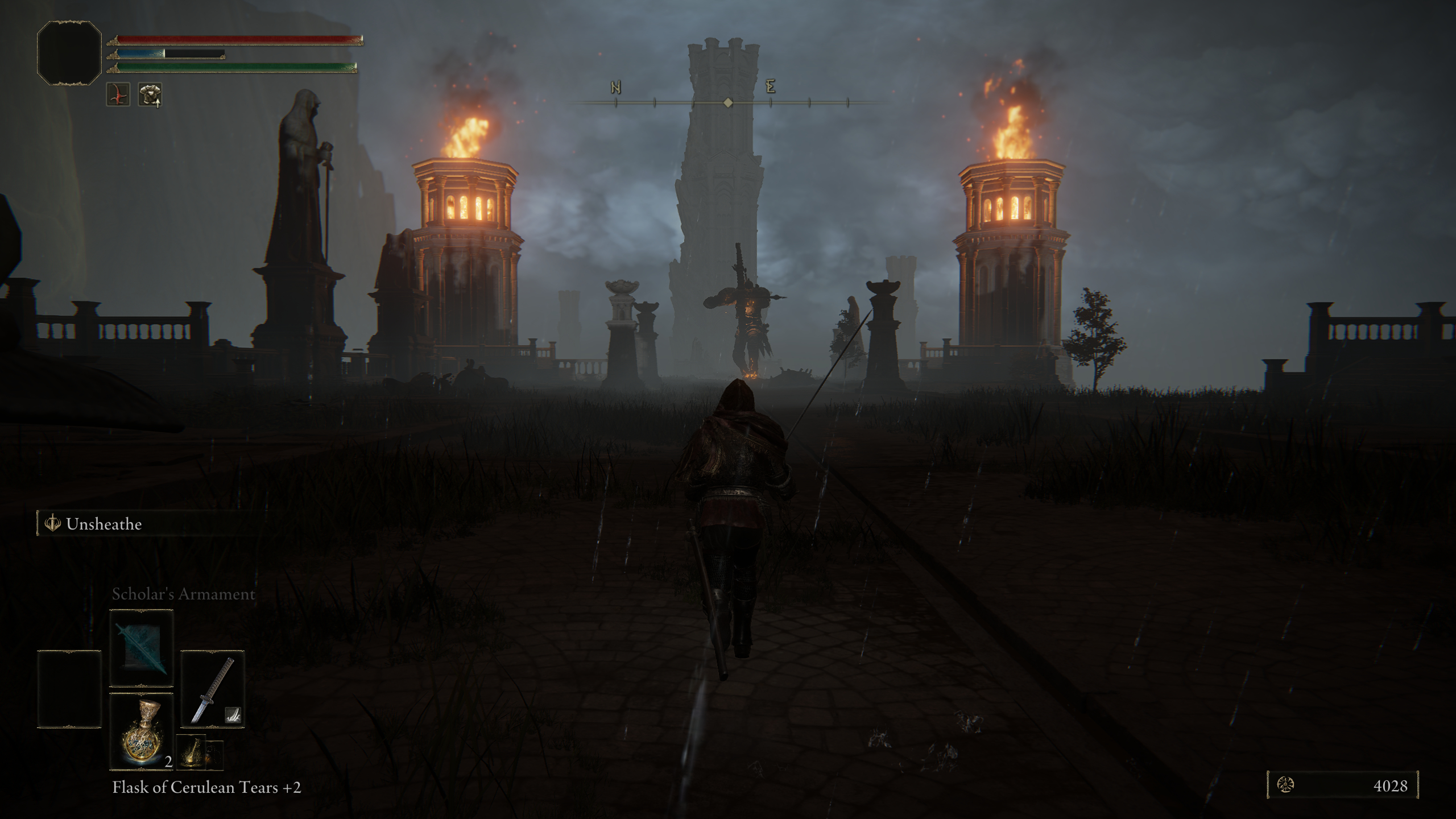
Nearly every boss (and enemy) have multiple chain attacks and also delay each strike in a way that confuses the player to make them roll early. Many bosses have an absurd range, and now that jumping has been introduced into the mix, players are sometimes expected to incorporate that into their fighting style.
Boss fights within the open world are at their coolest when surrounded by thick trees, ruined structures, or barricaded campsites, as enormous dragons can ruthlessly carve through the scenery, creating an even greater sensation of spectacle. Beyond that, the time of day cycle ensures many fights have their own unique feel to them, and a few bosses in particular can only be tackled during a specific time of day.
Nearly every boss roaming within the open world is great, but you'll probably notice that the terrain structure can lead to some jankiness. If you lead a boss a little bit out of their designated zone, they’ll disappear and reappear in their original spot. This happens when I don’t even intend it to, which can halt the momentum and break immersion. Additionally, fighting bosses on different elevations of terrain sometimes means they’ll clip through the ground while they swipe at you. This hasn’t happened to me a lot, but I’ve seen a boss get stuck more than once or twice.
Occasional repetition
Open-world games rely on elements becoming an expected occurrence, even when traveling to new areas. Unfortunately, this is true with Elden Ring, as players can expect to see similar ruins, shacks, churches, mini-dungeons and Evergaols scattered throughout the world. Ruins are a small collection of destroyed buildings inhabited by a certain group of enemies, and if you find the stairway leading downwards, it ends with a treasure chest. Sometimes, there’s a boss or an NPC, but the structure is generally identical.
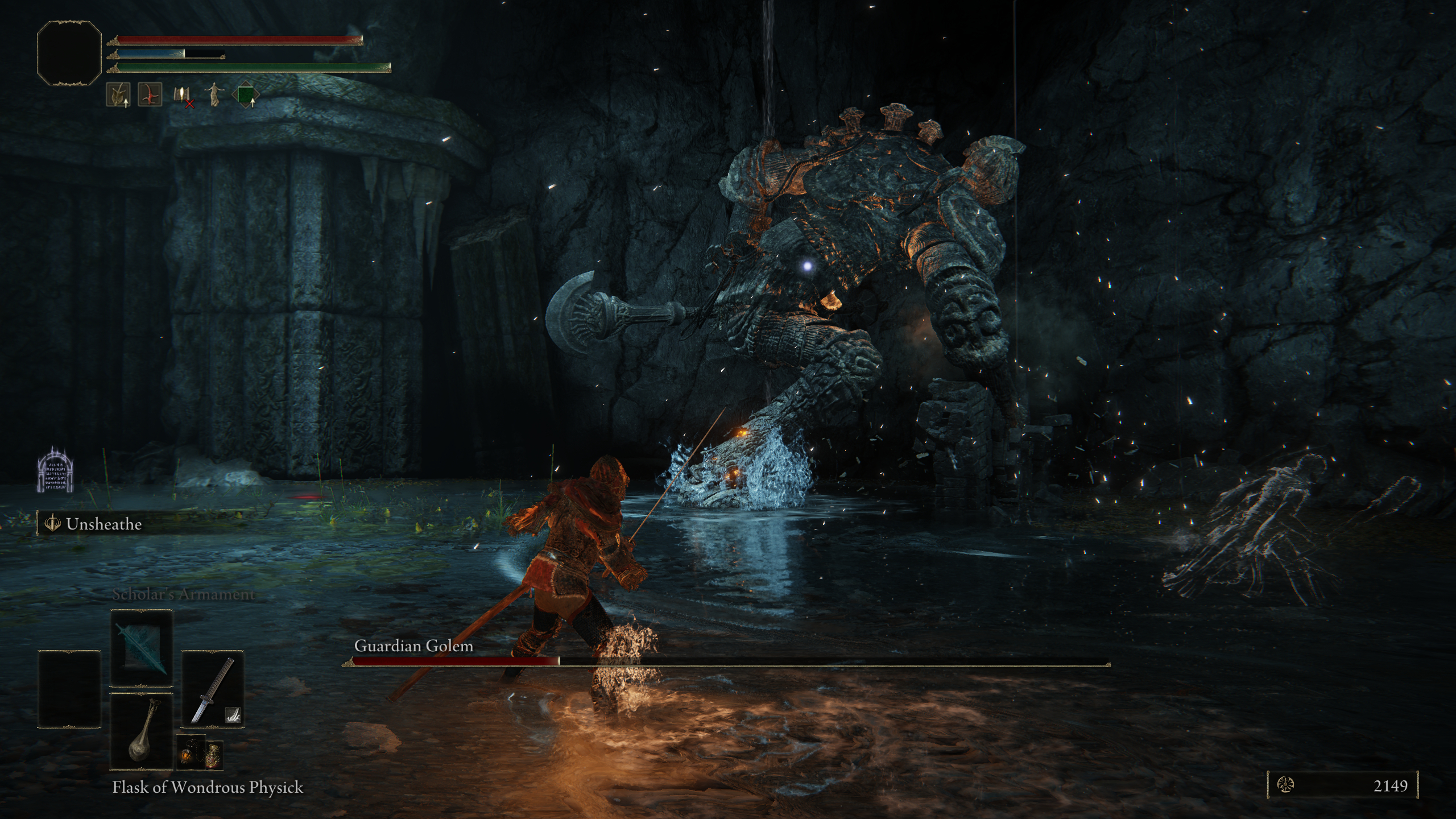
Shacks are tiny huts littered throughout the world, usually harboring a Grace point (essentially a Bonfire). There’s also an NPC around there sometimes, whether it be someone selling something or a quest giver of sorts. Similarly, Churches have the same effect, acting as a resting area with an NPC or another special item lying around.
Evergaols are giant platforms embedded into the ground with a glowing circle in the middle. If you enter the Evergaol, you get taken to a misty version of that part of the world, where you’re forced to face off against a boss. However, you can’t mount up or use Ashes here, which means it’s more like a sheltered encounter than one that’s roaming the environment. Although a few of the bosses can be underwhelming, most of them are fun, making this my favorite of the repeated elements.
The game’s mini-dungeons are the most egregious aspect, as they’re small underground zones with a repetitive aesthetic that jumps between a cave, mineshaft or catacombs. Similar to Bloodborne’s Chalice Dungeons, players run through tight spaces littered with enemies until they get to a boss. Sometimes there’s a twist that keeps things fresh, whether it be the catacombs always possessing a puzzle or mine shafts getting proceedingly more labyrinthian. But towards the end, I felt nothing but exhaustion whenever stumbling upon one. These mini-dungeons need more diversity, especially since many of them end with an upscaled version of a regular enemy boasting a bigger health bar.
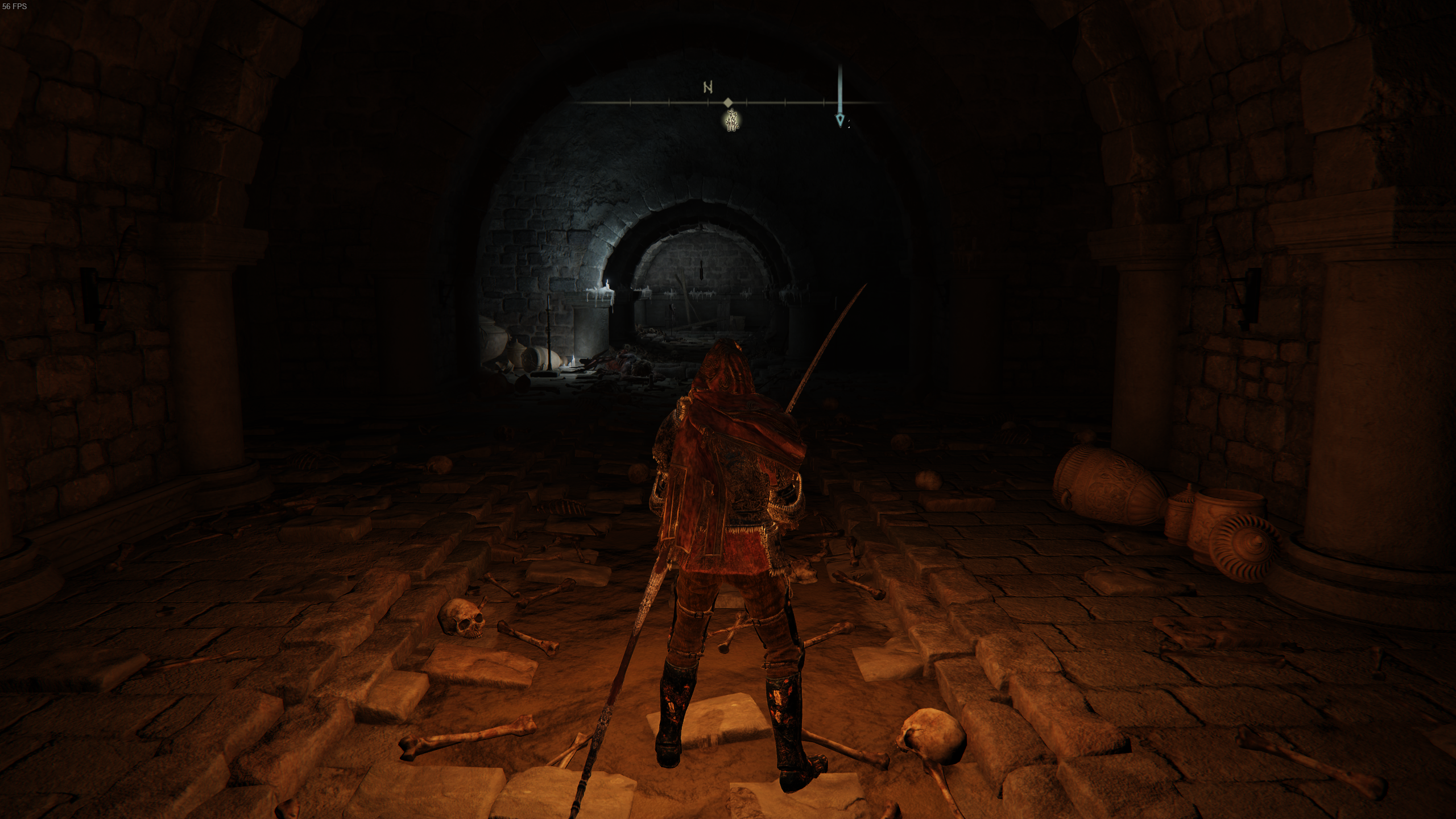
Ruins are rarely woven into environments, as remnants of whatever civilization previously inhabiting that space cannot be identified. Instead, these structures are made up of simple assets placed into the world with the sole purpose of awarding players with a new item upon completion. And even when diving deep into one of its basements, all that’s present is an empty room with a chest inside. The same can be said for the game’s shacks, churches and towers, as they look similar and typically exist to pad out the wilderness.
This certainly gives the player something to do within the open-world, but they rarely receive an exciting purpose or shift in aesthetic. These sections can be repetitive, and while that’s fine, it often hinders the fantastic momentum presented by the game’s best moments. A few churches, ruins and towers throughout the world can be interesting, making the potential of these structures clearer, whether that be because of the presence of a boss, unique NPC or a striking visual that you just won’t expect.
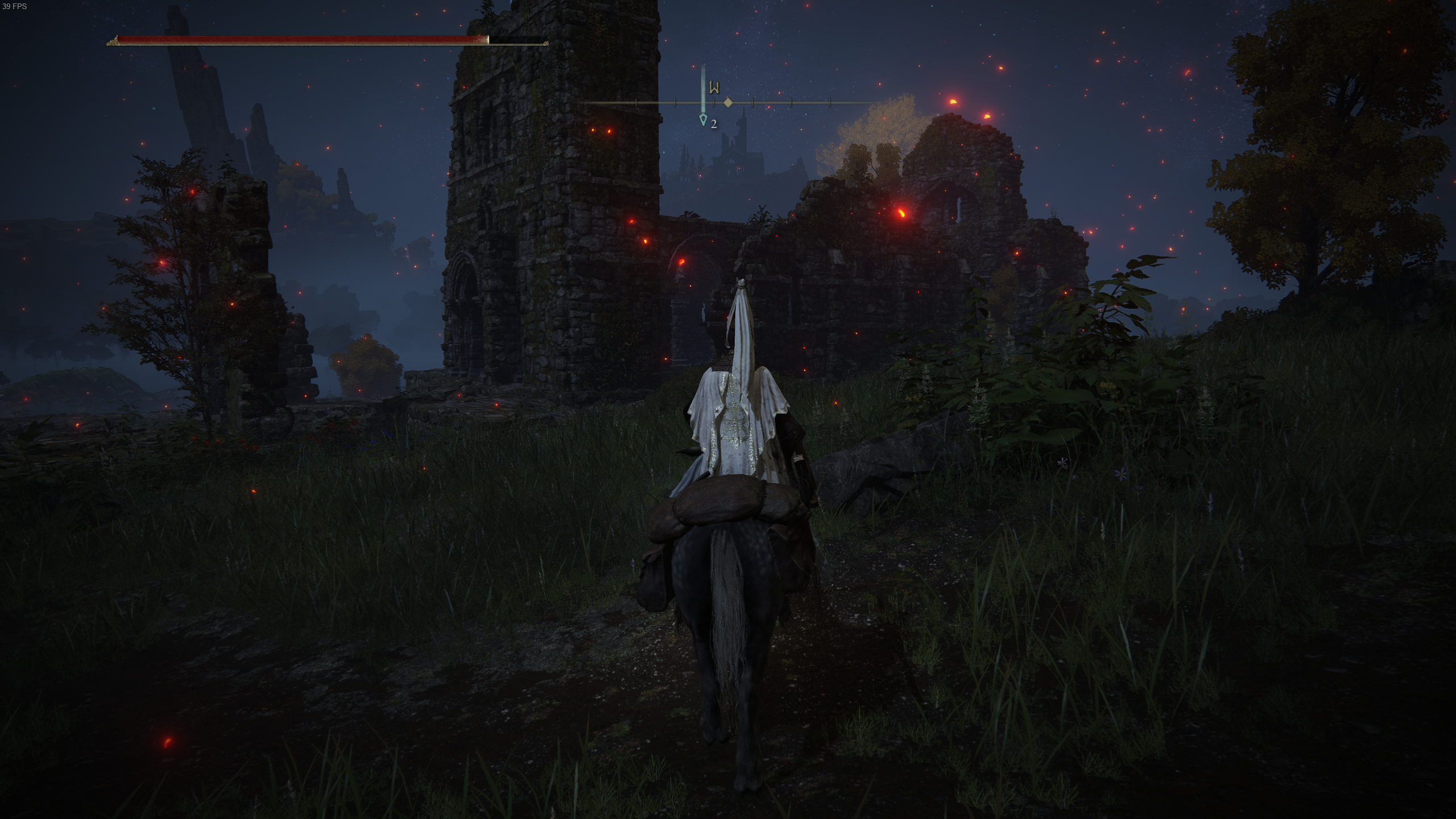
So much of The Lands Between is unique, but those moments when you’re fighting a reused boss or trudging through another white, candlelit dungeon can be a slog. And while the world is full of diverse foes, the massive size simply means you’ll end up fighting too much of everything. Expect to see giant crabs, bats, wolves, trolls, golems and plants roaming nearly every area, and even when you thought you were already too sick of one type of enemy, it’ll just keep on coming back.
And although there are many unique bosses, it gets exhausting when you see the fifth identical version of a specific type of boss you hate. This wouldn’t be a huge issue if it was limited to a select few, but most open-world bosses in Elden Ring are reused at least twice. This lack of variety can cause fatigue, especially in a series that is known for its inspired diversity.
This betrays the game’s initial promise. Limgrave has the player encountering a terrifying Tree Sentinel, screaming at the presence of a dragon crashing down upon a lake, and finding an undead mariner summoning skeletons throughout a distraught town. This level of diversity within the game's first section gives rise to an expectation for future areas to keep up that level of excitement. Yet within the final area, every open-world boss is rehashed. Elden Ring boasts plenty of diverse areas to explore, but these places are less thematically consistent when they don't boast their own unique architecture, enemies and bosses.
Crafting repertoire
Elden Ring introduces crafting and cooking. Throughout the game, you’ll hunt for meat and bones, or harvest foliage to collect plants and berries, and through the crafting menu, you’ll get the option to craft unique items. Arrows, perfumes, cured meat, throwing knives, boluses, grease and explosive pots are a few examples of what you can craft. There are many recipe books in the open world to find, and the more you have, the more you can craft.
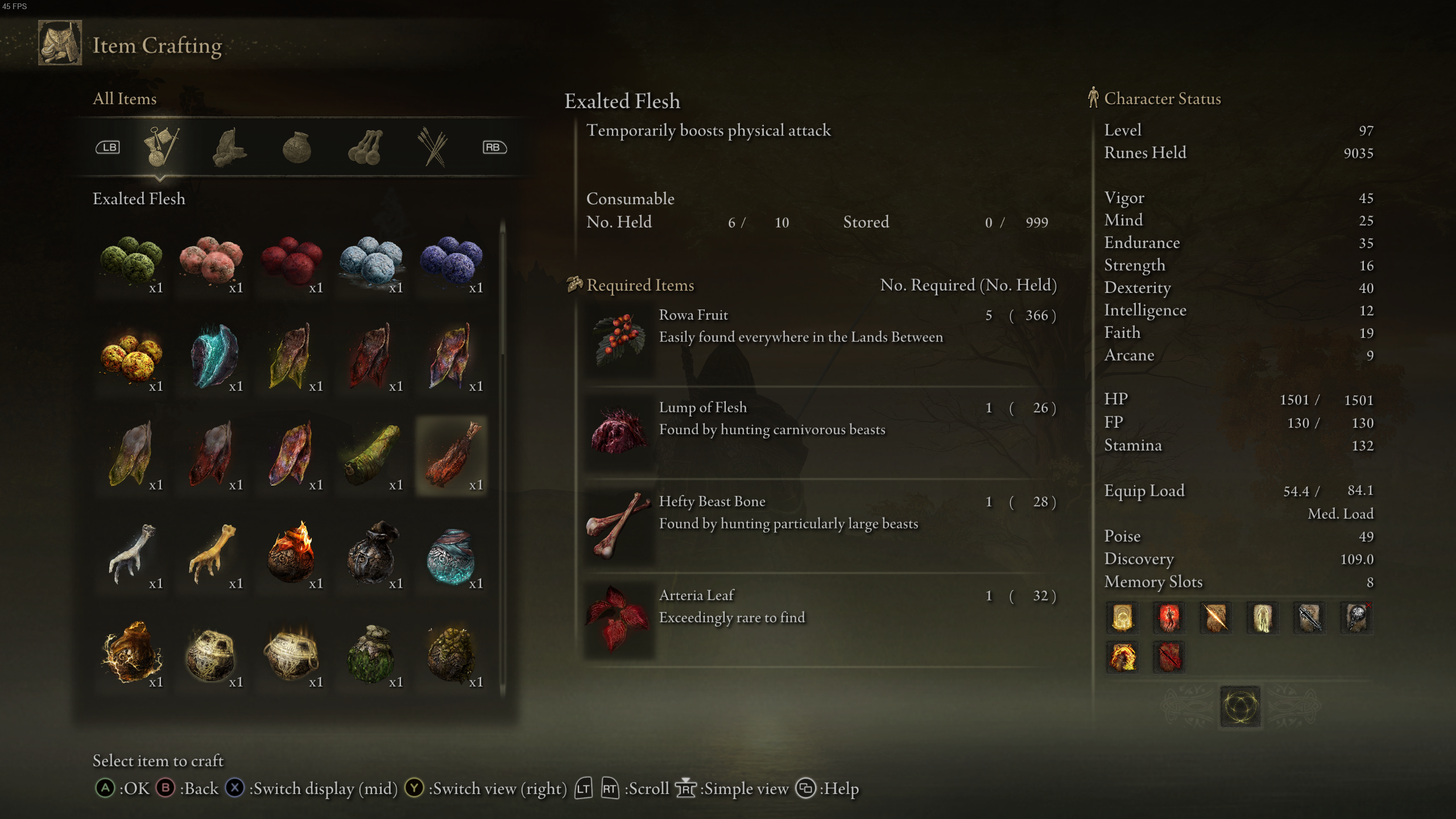
The items you craft are situational. Perhaps a nest of clawed eagles are clumped together, and you need to create some throwing knives to lure them out. Or maybe a specific boss keeps using a move that one-shots you, so you concoct a perfume that gives your character a protective bubble to significantly reduce the damage of that one strike. Or maybe, in very typical Soulsborne fashion, you’ve accidentally stepped in green gunk for too long so you rush into the crafting menu for some Neutralizing Boluses to cure your poisoned status.
Putting periphery items into a crafting menu is brilliant, as it means the treasures a player plunders within the depths of catacombs can be more distinct. Additionally, it gives the player more control over their inventory, so they have room to pick out the most worthwhile bonus items. And if the player is scrounging to craft something specific, the material description will inform them how to acquire it. For example, if I wanted to craft a Sacred Order Pot, which would let me throw a pot that deals holy damage, two of its main ingredients are a Golden Sunflower and a Golden Centipede. When hovering over the recipe, the former is “found near Minor Erdtrees,” whereas the latter is “found near churches and similar.” These descriptions can sometimes be a bit vague, but they usually help a bunch when in need of things to craft.
Elden Ring also introduces the Flask of Wondrous Physick, which is a potion that awards powerful buffs depending on the two boons mixed within. This potion is infinitely reusable, and is restored when resting at a grace point. My current Flask of Wondrous Physick enhances dodge rolls and increases stamina recovery rate. I can only drink this once between resting points, but it’s immensely helpful to use before a hard boss. Other boons can increase specific element damage, protect the user against a single attack, or restore health.
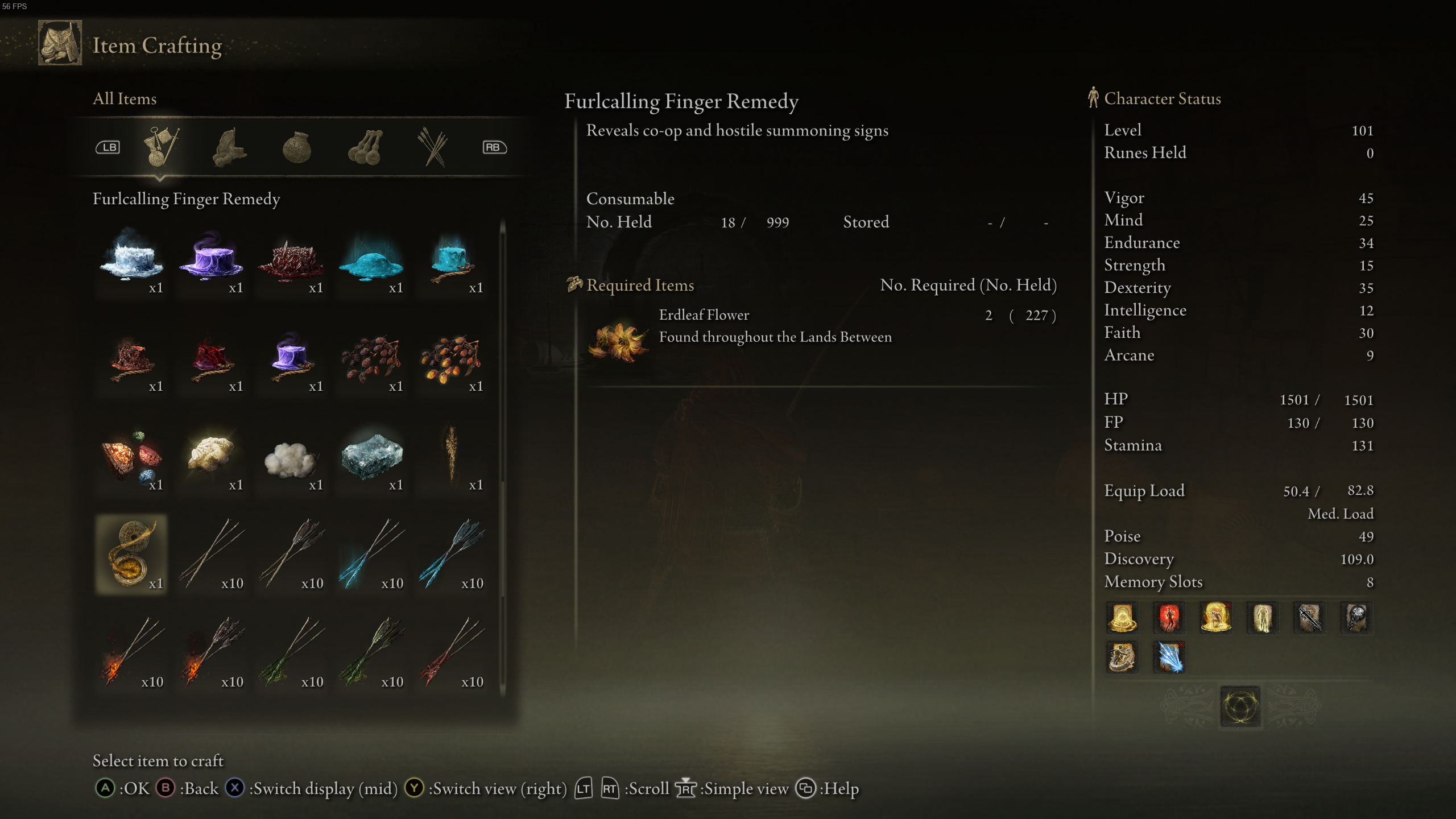
In the crafting menu is the Furlcalling Finger Remedy as well, which is made with a common leaf found in the open world. This item enables the player to see summon signs and initiate cooperative play. Since the material to create this is so abundant, it makes Elden Ring the most convenient game to play cooperatively in the Soulsborne series. And beyond just the convenience, the nature of its open world lends itself excellently to multiplayer.
Elden Ring encourages jolly cooperation
Demon’s Souls, Dark Souls and Bloodborne have quiet, but striking sound design, terrifying enemies, a sparse use of music, and a world overwhelmed with death. As a result, I’ve never enjoyed hopping in a Discord call and grouping up with friends while knee-deep in a Soulsborne. Having someone by my side is antithetical to the feeling of loneliness that I yearn for when playing these games. And since areas are often claustrophobic, enemy encounters rarely feel appropriate in multiplayer.
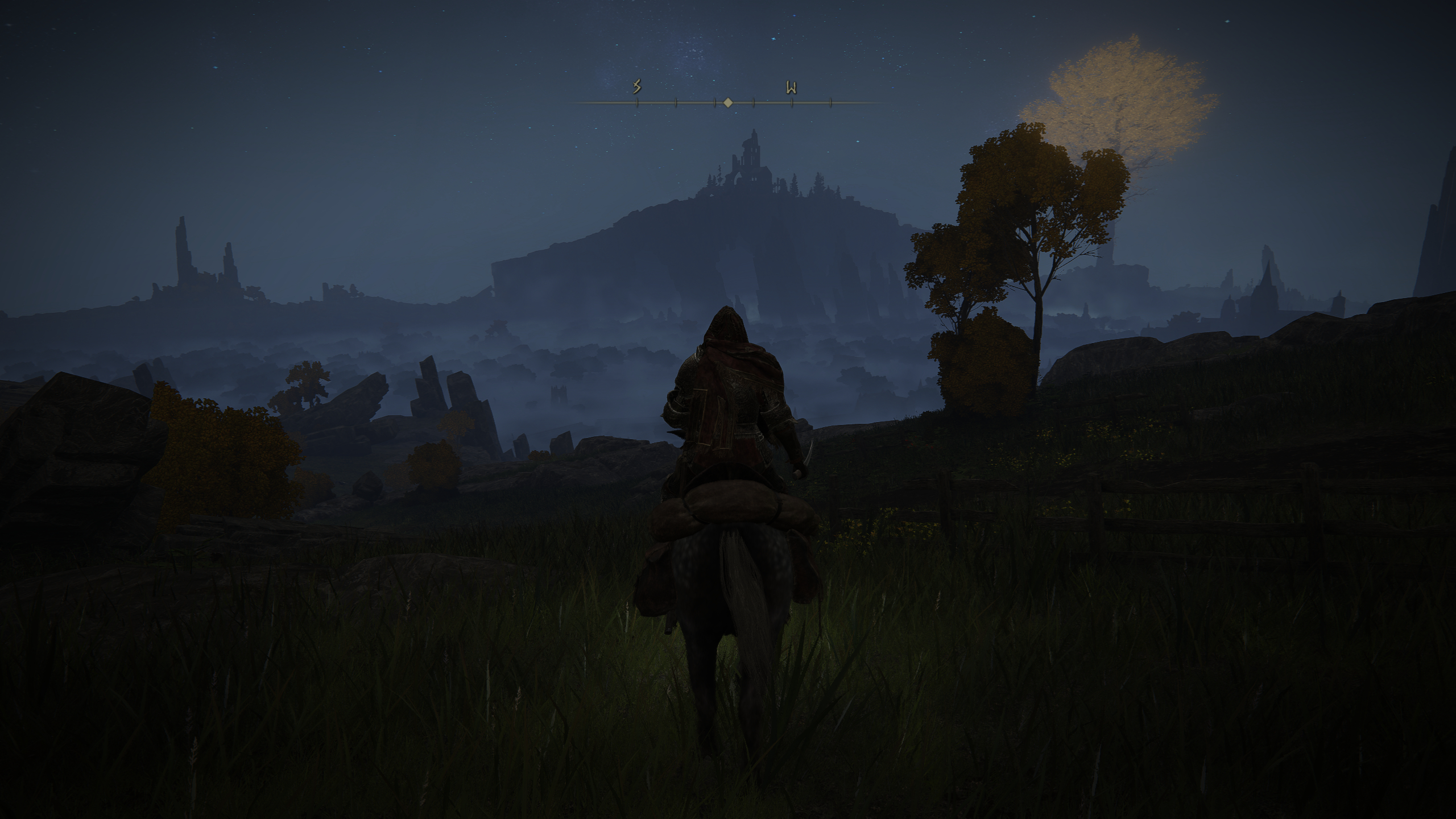
However, Elden Ring is different. The sound of metal boots clanking, the gusts of wind blowing through the grass, and the low crackling of fire is still the focus of the game’s sound design, but these great plains are imbued with life, boasting boars, rabbits and birds. Elden Ring is colorful and lush in a way that Dark Souls never was, and as a result, exploring these vast plains feels appropriate with a friend. I firmly believe this is the best Soulsborne to play with others.
Elden Ring PC performance
Elden Ring doesn’t have many bugs, but one I noticed is that the game crashed three times when teleporting to a site of grace. Additionally, I’ve noticed a few objects not loading correctly in the world. For example, the gate mechanism in Stormveil Castle was completely invisible, and it glitched out as my characters turned it. Otherwise, no other bugs noted.
Elden Ring has plenty of graphical settings that you can adjust. In the graphics tab, quality setting presets can be changed between maximum, high, medium and low. These alter SSAO, depth of field, and the quality of textures, antialiasing, motion blur, shadows, lighting, effects, volumetrics, reflection, water surfaces, shaders, global illumination, and grass.
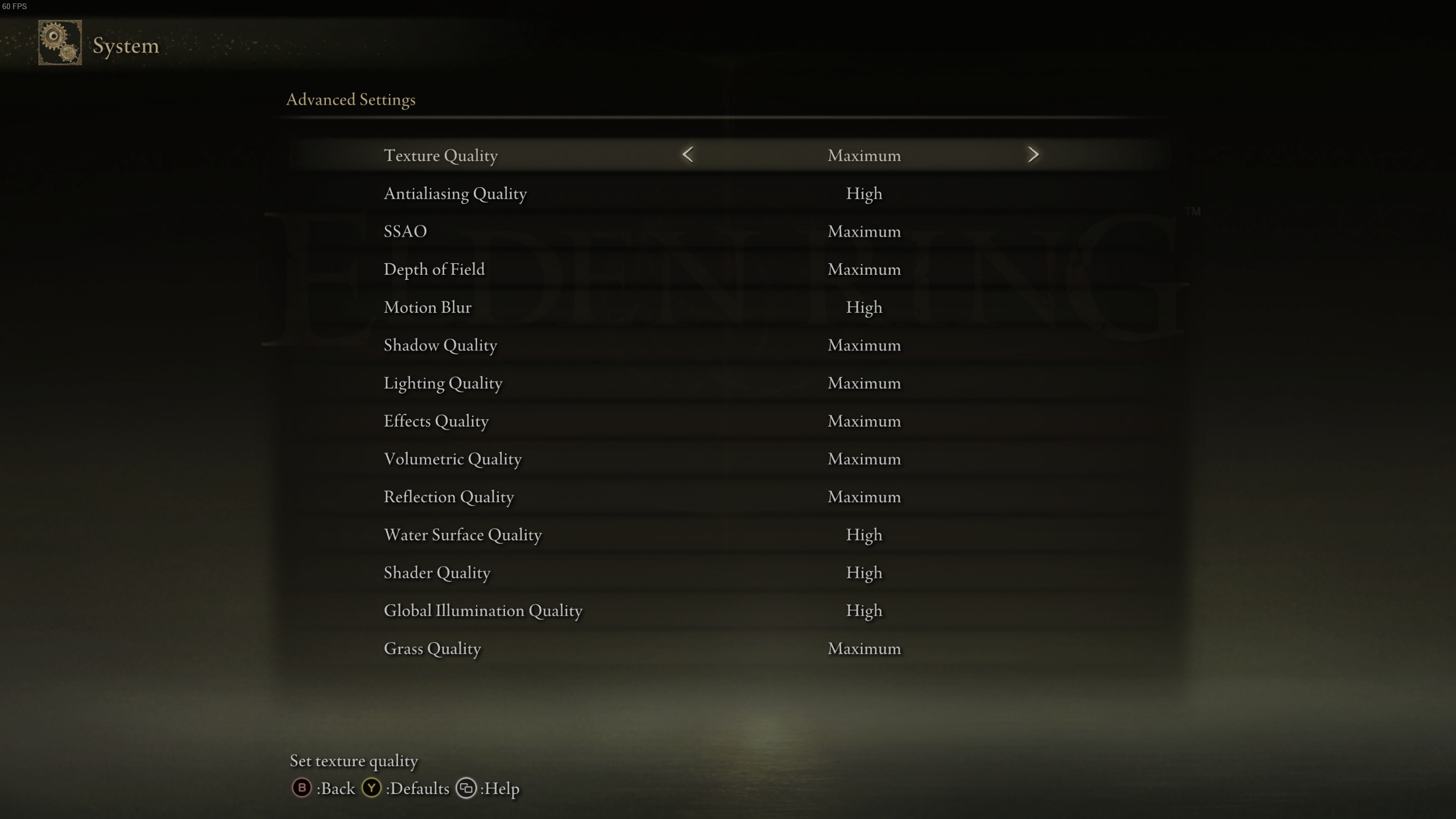
Unfortunately, Elden Ring does not support ultra-wide displays, so your resolution will be locked to 16:9. This isn’t new for FromSoftware games, but it sure would be nice if the company began thinking about expanding its resolution options.
Elden Ring PC benchmarks and requirements
I played Elden Ring using a desktop-level Nvidia GeForce GTX 1070 GPU with 8GB of VRAM, which is the recommended GPU requirement. With graphic settings at max and running at 2560 x 1440, I usually hovered between 40 to 50 frames per second. When exploring tight spaces, the game stayed at a pretty consistent 60 fps. However, during a downpour in the open world or intense boss fights, I’d occasionally experience stutter at 30 fps.
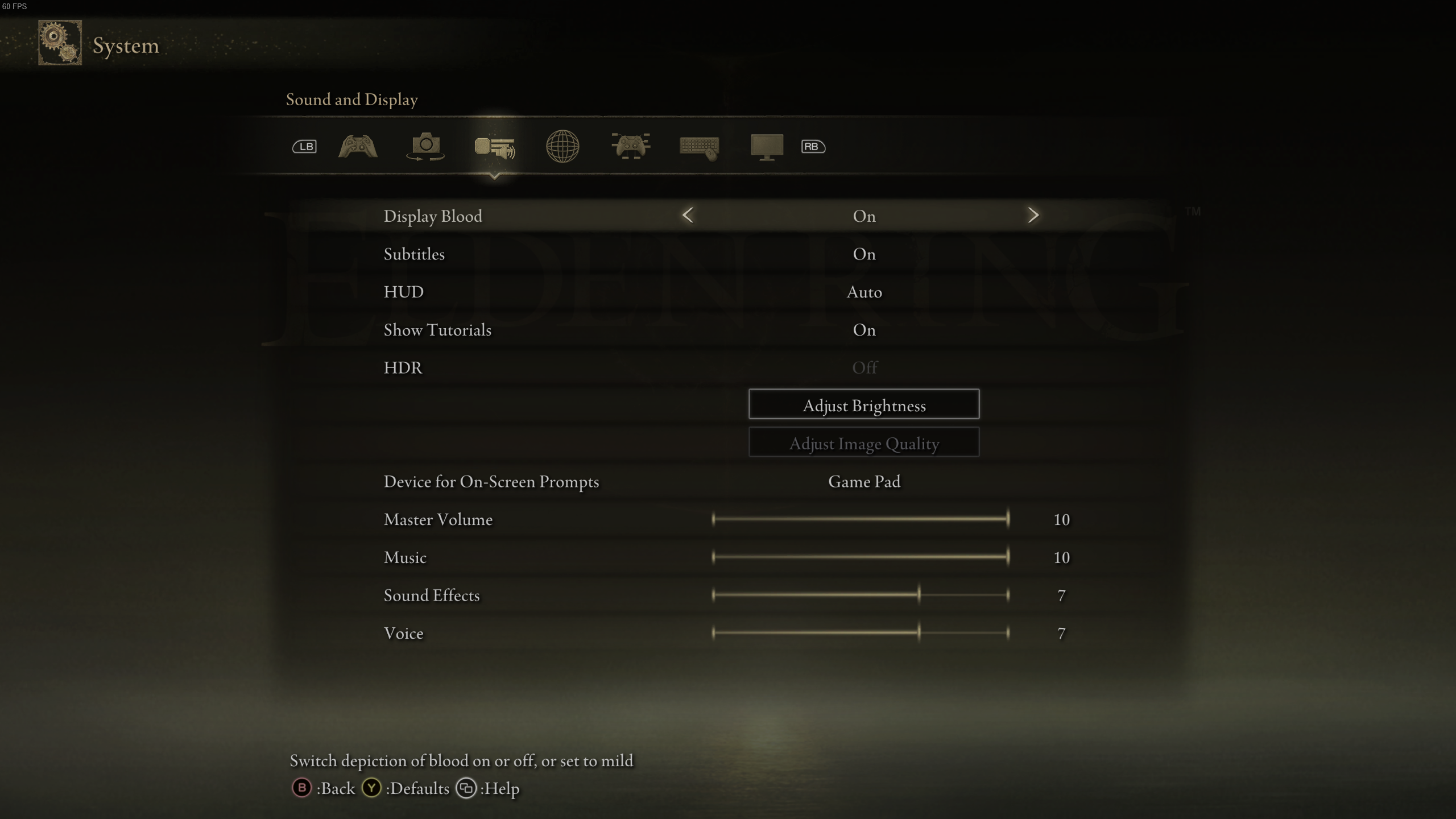
Playing at 1080p would boost that to around 50 to 55fps, and bringing the quality settings down to medium at 1080p gave me a consistent 60fps. However, this was absolutely not worth it for the quality loss.
Elden Ring’s minimum requirements include an Intel Core i5-8400 or AMD Ryzen 3 3300X processor, 12GB of RAM, Nvidia GTX 1060 3GB or AMD Radeon RX 4GB GPU, and 60GB of storage space.
Elden Ring’s recommended requirements include an Intel Core i7-8700K or AMD Ryzen 5 3600X processor, Nvidia GTX 1070 8GB or AMD Radeon RX Vega 56 8GB GPU, and 60GB of storage space.
Bottom Line
Elden Ring isn't as groundbreaking as Demon’s Souls was, nor is its world as imaginative as Bloodborne's Yharnam. Instead, this is an amalgamation of the many things we love and expect out of FromSoftware, tossed into an open world packed with breathtaking sights and exciting encounters. It’s also the team’s most intricate RPG yet, offering immense build diversity and a slew of captivating quest lines.
If you were hypnotized by the wondrous curiosity Breath of the Wild evoked in 2017, The Lands Between will similarly bind you. It’s a shame the experience is weighed down by bland mini-dungeons, rehashed boss fights and passable enemy diversity, but these faults are redeemed by the grandest moments this series has to offer.
Elden Ring is FromSoftware’s latest flawed masterpiece. While far from perfection, it’s the best open world game I’ve played and a substantial contender for game of the year.

Self-described art critic and unabashedly pretentious, Claire finds joy in impassioned ramblings about her closeness to video games. She has a bachelor’s degree in Journalism & Media Studies from Brooklyn College and five years of experience in entertainment journalism. Claire is a stalwart defender of the importance found in subjectivity and spends most days overwhelmed with excitement for the past, present and future of gaming. When she isn't writing or playing Dark Souls, she can be found eating chicken fettuccine alfredo and watching anime.

